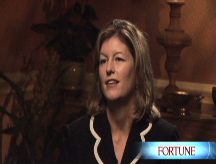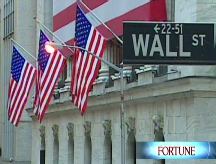4 ways to bet on emerging markets
Investor Daily: Experts say there's money to be made in select overseas industries and developing countries - if you can stomach the risk.
 |
| Some investment managers say Russian natural gas producer Gazprom is poised to bounce back when energy prices rebound. |
NEW YORK (Fortune) -- The last time we wrote about investing in emerging markets, we took a broad look at major indexes around the globe. Readers wanted to know more, namely possible ways to enhance returns by drilling down into particular companies, regions, or industries.
The answer depends on your risk appetite and whether you're willing to put in the time or pay a fee to a fund manager, instead of just riding the indexes. But if you're the adventurous sort, portfolio managers say there are plenty of opportunities to cherry pick the very best bargains outside the United States.
"We're like kids in a candy store," said Mark Mobius of Franklin Templeton, who basically invented emerging markets investing back in the 1960s and has run the Templeton Emerging Markets fund for more than two decades. "We're in a great bargain hunting era."
Many fund managers think the smarter plays are individual companies, not broader country funds or indexes. Emerging-market companies have come a long way from their inefficiency and rampant cronyism to become sophisticated global players.
"What we've seen emerge is a company story," said Brian Wolahan, who manages the Acadian Emerging Markets Equity fund. "Investors are looking much more carefully at individual companies."
So what companies, countries, or industries, could you be focusing on? We asked several top emerging-markets fund managers for a couple of key themes.
Commodities
Falling energy prices are clobbering commodity-exporting economies like Russia's. But when energy prices rebound, those markets are in a position to turnaround too.
"The Russian market is pricing in very negative scenarios in terms of energy demand," said Hugh Hunter of the WestLB Mellon Compass emerging markets fund. "We don't think that story will hold up over time." He recommends Gazprom (OGZPY), the state-supported natural gas giant.
David Semple, who runs Van Eck Global's emerging markets fund, likes capital equipment makers in addition to commodities players. He recently upped his stake in KNM Group Berhard (KNMG on Malaysia's exchange), a company that sells heating equipment to the oil and gas industry.
"It has solid management and cares about its product," said Semple. He also likes Taewoong (044490 on Korea's exchange), a supplier to the ship-building industry. While shippers have been hard hit by falling commodities prices, Taewoong also sells parts for wind turbines, which is expected to be a big business.
Currency
Emerging market currencies are getting hammered as investors flee to safe havens like the dollar and the yen. But some companies are affected more than others depending on their country's currency policies.
Steer clear of companies based in Eastern European countries like Hungary and the Ukraine, which received IMF bailouts after their currencies plunged. Investors too would do well to focus on countries like China or Russia that have big cash piles - often reflected in the size of their sovereign wealth funds, or government-sponsored investment funds - to bolster their currencies.
China is worth a close look. One reason is because the Chinese yuan is relatively fixed to the U.S. dollar. "Chinese stocks tend to closely track the dollar," said Lewis Kaufman, of the Thornburg International Value fund. "You're afforded a lot of protection from currency risks." The same goes for companies in Korea and Russia, both of which have big sovereign wealth funds.
On the flip side, Franklin Templeton's Mobius is avoiding many Mexican and Brazilian companies because of bad currency hedges that are creating huge losses on their balance sheets.
Mexico's Gruma (GMK), for example, has reported poor earnings because of ill-timed currency trades. Read a company's prospectus to see if they're reporting large hedges, or investments meant to protect them against rises or falls in commodity or currency prices. "The big lesson is, always watch for derivatives," said Mobius. "The financial crisis isn't just in the U.S. and Europe. It's global, as everybody is hooked into each other through derivatives trading."
Name brands
Just like in the United States and Europe, investors are looking at companies selling recession-resistant consumer goods in the developing world. Many are household names abroad, but not here.
Mobius, for instance, likes door-to-door cosmetics seller Natura (NATU3 on Brazil's exchange) and Swedish peer Oriflame (OFLMF), which is big in Russia. "Cosmetics are a high-margin business, and pretty resistant to consumer-led recessions, even in the lower-middle income category," he said.
He also recommends food companies like Brazilian poultry-processor Predagau (PDA) and Kimberly-Clark de Mexico (KCDMY), which sells basic necessities like diapers and toilet paper. The Merrill Lynch emerging markets consumer staples index is down only 41% in 2008, versus 58% for its consumer discretionary index.
Small caps
Van Eck's Semple points out that small-cap emerging market indexes have been leading indicators of turnarounds in previous recessions. After the Asian financial crisis in 1997 and the dot.com collapse in 2001, small caps hit their lows before larger indexes did.
Small companies, said Semple, get hit hard during downturns but they stabilize quickly. The MSCI emerging markets small cap index is down only 2% more than the broader index this year. You'd expect a much bigger drop if the market saw such companies as substantially riskier than large caps.
Van Eck's emerging markets fund has recently added, among other small companies, Peace Mark Holdings (304 on Honk Kong's exchange), which distributes watches and other jewelry into China, and Champagne Indage (INDG on India's exchange), a Mumbai-based winery that sells Indian wines globally and distributes foreign wines in India.
Investing in specific overseas sectors or companies isn't for the faint of heart. But with enough research and appetite for risk, it might just pay off.
Looking for guidance in navigating these choppy markets? Let us know what topics you'd like us to cover and we'll try to address your questions in an upcoming Investor Daily. Please note: Fortune cannot give personalized advice on specific investments in your portfolio. ![]()
-
 The retail giant tops the Fortune 500 for the second year in a row. Who else made the list? More
The retail giant tops the Fortune 500 for the second year in a row. Who else made the list? More -
 This group of companies is all about social networking to connect with their customers. More
This group of companies is all about social networking to connect with their customers. More -
 The fight over the cholesterol medication is keeping a generic version from hitting the market. More
The fight over the cholesterol medication is keeping a generic version from hitting the market. More -
 Bin Laden may be dead, but the terrorist group he led doesn't need his money. More
Bin Laden may be dead, but the terrorist group he led doesn't need his money. More -
 U.S. real estate might be a mess, but in other parts of the world, home prices are jumping. More
U.S. real estate might be a mess, but in other parts of the world, home prices are jumping. More -
 Libya's output is a fraction of global production, but it's crucial to the nation's economy. More
Libya's output is a fraction of global production, but it's crucial to the nation's economy. More -
 Once rates start to rise, things could get ugly fast for our neighbors to the north. More
Once rates start to rise, things could get ugly fast for our neighbors to the north. More












